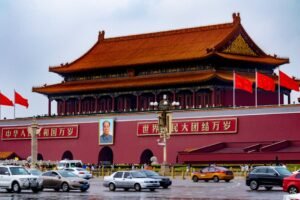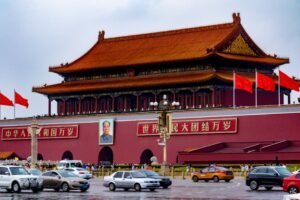Exploring bookstores and libraries in China can be a delightful adventure for avid readers and language enthusiasts. It provides an opportunity to thoroughly immerse oneself in a wide range of Chinese literary works and a unique method for enhancing Mandarin language competence.
Table of Contents
ToggleUnderstanding the Layout
Chinese bookstores and libraries often have distinct sections like their counterparts elsewhere. Typical sections include 文学 (wénxué – literature), 历史 (lìshǐ – history), 科学 (kēxué – science), 儿童书籍 (értóng shūjí – children’s books), and 外文书籍 (wàiwén shūjí – foreign language books). Knowing these terms can help you find the right section quickly.
Essential Vocabulary for Book Lovers
书店 (Shūdiàn) – Bookstore
图书馆 (Túshū guǎn) – Library
小说 (Xiǎoshuō) – Novel
作者 (Zuòzhě) – Author
目录 (Mùlù) – Catalog/Index
借书 (Jiè shū) – Borrow Books
还书 (Huán shū) – Return Books
推荐 (Tuījiàn) – Recommend
畅销书 (Chàngxiāo shū) – Bestseller
阅读区 (Yuèdú qū) – Reading Area
Phrases for Navigating Bookstores and Libraries
“Where can I find novels?” – “请问小说在哪里?(Qǐngwèn xiǎoshuō zài nǎlǐ?)”
“Can you recommend a good book?” – “你能推荐一本好书吗?(Nǐ néng tuījiàn yī běn hǎo shū ma?)”
“Do you have books in English?” – “你们有英文书吗?(Nǐmen yǒu yīngwén shū ma?)”
“How much is this book?” – “这本书多少钱?(Zhè běn shū duōshǎo qián?)”
“I would like to borrow this book.” – “我想借这本书。(Wǒ xiǎng jiè zhè běn shū.)”
Tips for a Fulfilling Experience
Explore Beyond Bestsellers: Chinese literature is rich and varied. Venture beyond bestsellers to discover classic works and contemporary gems.
Interact with Staff and Readers: Don’t hesitate to ask for recommendations or discuss books with staff and fellow readers. This can be a great way to practice your Mandarin in a real-world context.
Attend Events: Bookstores and libraries in China often host readings, author talks, and cultural events. Participating in these can enrich your understanding of Chinese literature and culture.
Utilize Digital Resources: Many libraries in China offer digital catalogs and online resources. Familiarize yourself with these to make finding books easier.
Respect Library Rules: If you’re in a library, be mindful of rules regarding food, drinks, and noise levels.
Conclusion
Navigating Chinese bookstores and libraries is not just about finding books but immersing yourself in a cultural experience. Whether you’re a beginner in Mandarin or an advanced learner, engaging with the world of Chinese books can significantly enhance your language skills and provide a deeper understanding of Chinese society and culture. So, step into a bookstore or library next time you find yourself in China, and let the adventure begin!
FAQ: Mandarin for the Bookworm
Q1: Do I need to be fluent in Mandarin to navigate bookstores and libraries in China?
A1: While fluency makes the experience more accessible, it’s unnecessary. As highlighted in the article, knowing basic vocabulary and phrases can significantly aid in finding and selecting books. Many bookstores in larger cities also have staff who can speak some English.
Q2: Are English books available in Chinese bookstores and libraries?
A2: Many large bookstores and libraries in major cities have a section for foreign language books, including English. However, the selection might be limited compared to Mandarin books.
Q3: Can I borrow books from a library in China as a tourist or non-resident?
A3: This depends on the library’s policy. Some libraries may allow tourists to use their facilities or access digital resources, but borrowing physical books typically requires a membership, which may only be available to some residents.
Q4: How can I find out about events at bookstores or libraries?
A4: Events are often advertised on the bookstore or library’s website, social media pages, or through local community boards. Asking staff directly can also be an excellent way to learn about upcoming events.
Q5: Is reading books in the bookstore acceptable without buying them?
A5: In many Chinese bookstores, browsing books without purchasing them is acceptable, especially in larger stores with dedicated reading areas.
Q6: Can any apps or websites help me find bookstores or libraries in China?
A6: Yes, apps like Dianping or Baidu Maps can help you locate bookstores and libraries in China. They often include user reviews and ratings, which can be helpful.
Q7: How do I ask for a specific book or author in a Chinese bookstore?
A7: You can ask, “请问你们有[author’s name]的书吗? (Qǐngwèn nǐmen yǒu [author’s name] de shū ma?)” meaning “Do you have books by [author’s name]?” Replace [author’s name] with the name of the author or book title you’re looking for.
Q8: Can I find academic or specialized books in Chinese bookstores?
A8: Large bookstores often have sections for academic and specialized books, though the range might be more limited than general literature.
Q9: Are there any etiquette tips I should know in Chinese bookstores or libraries?
A9: General etiquette in Chinese bookstores and libraries includes being quiet, respecting space and materials, and not damaging books. Eating or drinking might be frowned upon, especially in libraries.
Contact our head teacher, Chen Huimin, at info@lcchineseschool.com if you want to learn Chinese or have additional questions about our Chinese programs.
Sign up for a free trial class here.
Learn about our Internship Program in China.
Get free Chinese learning resources.
Learn about China’s 2024 Offical Holiday Schedule







